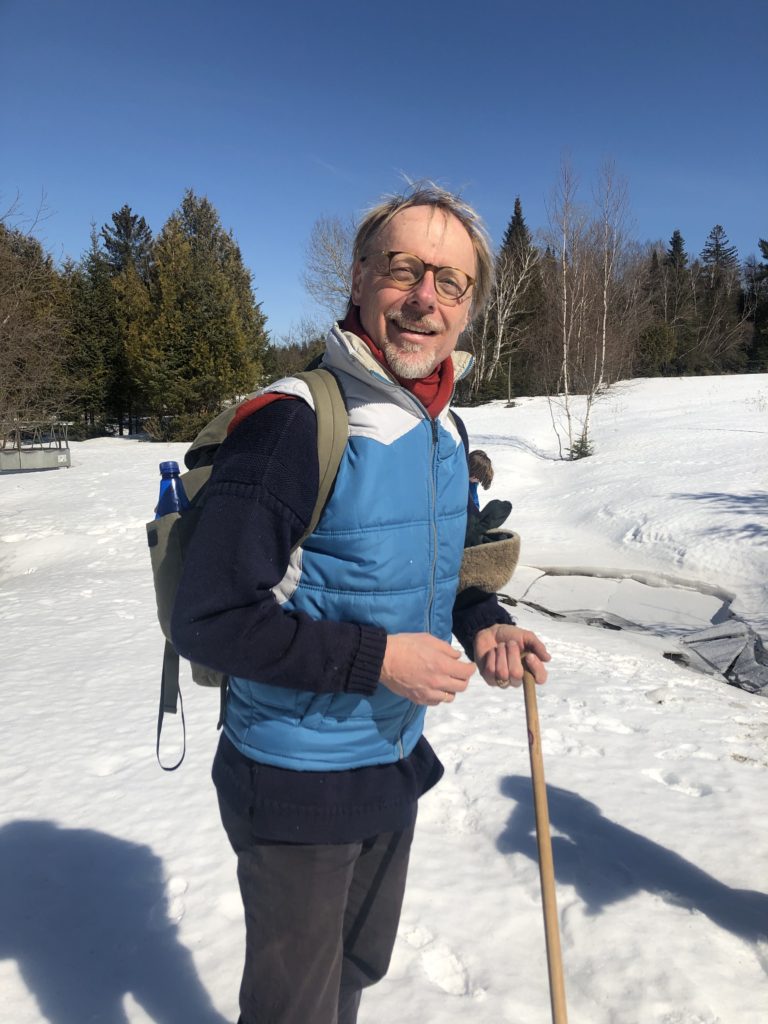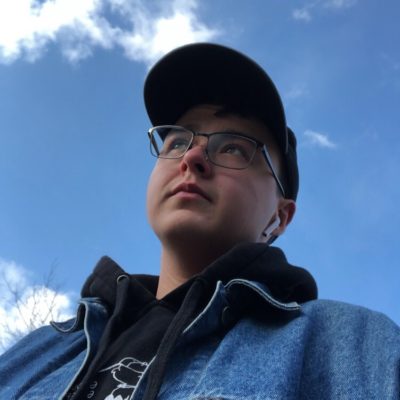
Back in the summer of 2020, still in the early months of the COVID-19 pandemic and its wide-ranging social restrictions, MA student Andrew Roberge initiated an interview with Listening, Sound, Agency symposium participant, Andre Furlani, whose recent research explores the poetics and politics of ambulation, or, walking. In this interview, learn more about Furlani’s research into the relationship between walking and sound, and about his interest in particular kinds of soundwalks. The topic seems especially poignant now, so many months into the pandemic, when walking, and simply being outside and listening, have become cherished activities for much needed sensuous experience, and for our sense of connection to our environments, and to others (even if, at a distance).
How did you first get thinking about walking and poetics?
I pretty much walked into this research topic. In Montreal I usually commute on foot, and at our cottage in the Eastern Townships I prefer to take my notes out of doors, so walking insinuates itself into my studies. In Montreal, by virtue of the St. Lawrence and the ridge that our pride calls a mountain, you can easily ramble through city and country, between riverbank, plateau and summit. And because Montreal is a four-season city with extravagant fluctuations in weather, there’s a great variety of sounds.
Can you give a bit of a teaser for your planned paper for the conference?
For my presentation at the conference I’ve selected an excerpt from an audio blog that takes heed of that profusion. For so ethereal a medium, sound is textured and grained, its volume not just amplification but tissue. Sound shakes up the flesh, after all: pulse pummeling membrane. And sound discernably travels, has duration; passing through as we pass by. The Soundwalking Interactions blog captures the shifting dynamics of the noisy city. Urban photography is by contrast almost a contradiction in terms; even the best, like Gary Winogrand’s brisk Brooklyn street pics, unavoidably stills and sterilizes the turbulence of his sidewalk subjects.
Can you tell us about the audio project you have chosen to present with your profile?
Soundwalking Interactions was a Montreal research project led by Andra McCartney. I will play audio from the Balade Montréal Equinox blog, recorded along the lower rue St. Laurent on 21 March 2013. The team’s shuffle up Montreal’s Main, radial vein of Canadian immigration, takes soundings rather than makes pronouncements. The piece is more expository than interpretative, not discursive but excursive, in the literal sense of sallying forth. Soundscape materials are fortuitously scavenged rather than stalked, metonymic rather than metaphorical, asyndetic rather than coordinate. Many of the sounds are acousmatic, their origin unknown. The result is not a tidy hierarchy of discrete signals but a scruffy inventory of vibrations of uncertain provenance. Instead of elucidatory narrative sequences Balade Montréal Equinox produces estranging lyric effects. A prime acoustic effect is however inaudible: legally prohibited from disseminating intelligible sentences, the team had to efface the most bewitching cacophony of this storied immigrant street of the dual-language city, its diverse languages. At its best, paradoxically, Soundwalking Interactions teaches you to discard your earphones, take a stroll and hearken to the city.
What are you listening to these days?
These confined days I’m listening to birdsong above all, amid a plethora not of urban but of rural sounds. Lockdown coincided with earliest spring and, retrenched in the country, my family has listened entranced to returning warblers, spring freshets, lowing calves, unfurling leaves in the wind (Philip Larkin’s “afresh afresh afresh”), pondside frogs, coyote howls, groundhogs brushing across the grass, even, while the pond was still frozen, the vibration of beavers stirring in the lodge under our feet.
In city or country I rarely rely on a portable digital device, and earphones never, as one already hears so much, now more than ever. In the country such a variety of sounds carry. Because our hearing is so willingly dampened to the surroundings, and our acoustic literacy correspondingly impaired, the audio platform invaluable here is the Cornell Ornithology Lab website. It is often easier to hear a bird than to spot one, and the website allows us to match, for instance, a rich descant with the brown thrasher before we catch sight of it tossing leaves at the foot of the lilac. The Cornell site provides not only a repository but also superb remedial tools to help one listen in. If we heard birds more knowledgeably we might be more willing to reverse their rate of extinction.
A good walk substitutes diffuse, receptive attention for one’s usual narrow intention. Dilation of the hearing is the opposite of earphones; the deliberating brain is less involved, the liberating body more. Since cognition is not only intentional but also participatory and embodied, the sound walk is an exercise in hearing the unintended and in thinking with the moving body. We speak of thinking on our feet, but perhaps we might also think with our feet. In his novella Histoire de pied, J.M.G. De Clézio asks, “les pieds peuvent-ils entendre?” Soundwalking Interactions suggests how we might indeed do well to hear with our feet.
Professor of English at Concordia University, Andre Furlani is the author of Beckett after Wittgenstein, Guy Davenport: Postmodern and After (both Northwestern UP), and of the forthcoming The Pilgrim’s Gress of Samuel Beckett (Cambridge UP). Recent essays on modern and contemporary literature have appeared in PMLA, Modernism/ modernity, Philosophy and Literature, Essays in Criticism, Bréac, and Canadian Literature, as have chapters in The Oxford History of the Classical Reception in English Literature (Oxford UP) and Speaking Memory: How Translation Shapes City Life (McGill-Queen’s UP). Forthcoming is a chapter in The Routledge Guide to Translation in the City (Routledge) and an article in Journal of Modern Literature.
This article is published as part of the Listening, Sound, Agency Forum which presents profiles, interviews, and other materials featuring the research and interests of future participants in the 2021 SpokenWeb symposium. This series of articles provides a space for dialogical and multimedia exchange on topics from the fields of literature and sound studies, and serves as a prelude to the live conference.
